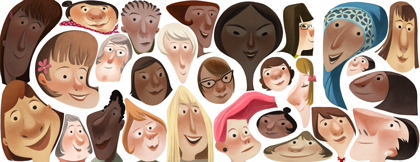Don't forget to submit an entry to theSecond Annual Star of Davida Essay Contest!
Only extremely special individuals in Tanakh (the Jewish Bible) experience miracles from God. Batya is one of those people. When she was bathing in the Nile River, she saw baby Moses’ basket floating in the water. She reached out for it, and her arm lengthened so she could grab it. The verse says that she sent her maidservant to get the basket, but the Talmud explains that the word for maidservant is really referring to her arm. Batya’s heart was completely devoted to that effort, so God extended her arm. This teaches us that when we put in our effort with a full and selfless heart, God will help us achieve that goal.
The Midrash says that Hashem only refers to Moses by the name that Batya gave him. Why? This is Batya’s reward for saving him as an infant, since this was an extreme act of hesed (lovingkindness). The degree of self-sacrifice that Batya exhibited becomes evident when one considers what Pharaoh might have done to her had he discovered his own daughter’s disloyalty.
Another Midrash says that Batya left Egypt with the rest of the Jews when Pharaoh finally gave them their freedom. Eventually, she married Caleb. Both were rebels: Batya against her father because she saved Moses against his wishes, and Caleb against the plans of the other Spies because he gave a good report about the land of Israel.
There are nine people who entered Heaven but did not actually die. Of the two women on the list, one is Batya. Interestingly, the other woman, Serah bat Asher, also exited Egypt when the Jews were freed from slavery.
Batya was raised as a princess of Egypt, the land of idolatry and immorality where the Jewish people fell to the 49th level of impurity (out of a total of 50 levels). Nobody would have expected Batya to be anything but immoral and cruel, like her father Pharaoh. However, the Talmud says that she rose above this life path set out for her and went to the Nile every day to wash off the impurity of Egypt and the idolatry of her father’s house. She was able to understand the low level of Egypt, even though it was the land where she was raised, and see the holiness of the Jewish people. This holiness resonated with her so much that she converted. The Ba’al HaTurim, one commentary on Tanakh, explains that Batya went down to the Nile on the day that Moshe’s basket came by to finalize her conversion by immersing in living water.
Batya’s long-term influence on the Jewish people is clear: it is directly because of her actions that the Jews were freed from slavery in Egypt. Had she allowed Moses’ basket to float by and not taken him in and raised him as her own, he never would have been able to lead the Jews and speak with Pharaoh on their behalf. We would still be building bricks for the Egyptians if not for Batya.
This Passover, we should all remember that although Moses was the savior of the Jewish people, he couldn’t have done it without Batya.
I dub Batya an inductee into the Shining Stars of Davida - strong women and men who make us feminists proud.
Passover begins on Monday night. Have a hag kasher v'sameah (a kosher and happy holiday)!
